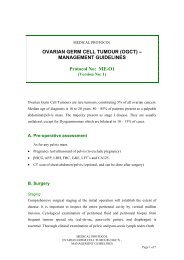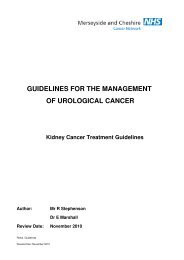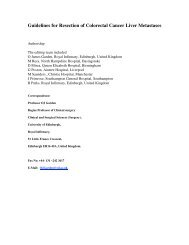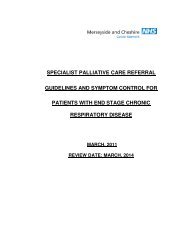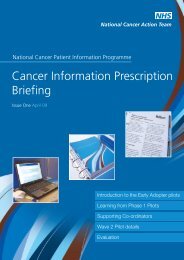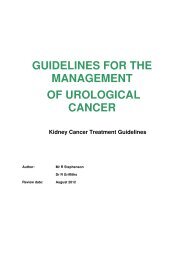Cancer Reform Strategy - NHS Cancer Screening Programmes
Cancer Reform Strategy - NHS Cancer Screening Programmes
Cancer Reform Strategy - NHS Cancer Screening Programmes
- No tags were found...
Create successful ePaper yourself
Turn your PDF publications into a flip-book with our unique Google optimized e-Paper software.
126 CANCER REFORM STRATEGY11.8 Service improvements have only beenpossible because of the hard work anddedication of the staff who work with cancerpatients. It is vital that they are supported withappropriate training. Several training initiativesrelating to the continuing professionaldevelopment of senior clinicians have beeninitiated centrally over the past few years tofulfil commitments in the <strong>NHS</strong> <strong>Cancer</strong> Plan or torespond to new developments. These trainingprogrammes are helping to drive up the qualityof care and to reduce waiting times for patientswith cancer. <strong>Programmes</strong> include:●A national endoscopy initiative which aims toimprove the quality and quantity ofendoscopists;● A national training programme for all 187colorectal cancer teams in England, with acentral focus on improving the quality anduptake of total mesorectal excision (TME);●●Advanced communication skills training; andSentinel node biopsy training for breastcancer teams, reducing the need for patientsto stay overnight in the hospital, lower coststo the <strong>NHS</strong>, enabling faster recuperation andresulting in higher patient satisfaction.11.9 The “Making Progress on Prostate <strong>Cancer</strong>”report announced plans to develop masterclasses in specialised urological surgicaltechniques to improve outcomes of surgicalprocedures in the treatment of prostate cancer.Following advice from the Prostate <strong>Cancer</strong>Advisory Group, it was decided that the focusshould extend to cover MDTs rather than justsurgeons. In March 2007 St James Hospital <strong>NHS</strong>Trust, Leeds was awarded the contract to run asmall pilot of three to four training coursesinvolving a total of 15-20 MDTs, an evaluationwill be completed within twelve months of workcommencing. The aim of the pilot is to enhanceMDT working and improve the quality ofsurgical techniques (focusing initially on openprostatectomy) to improve clinical outcomes,reduce side effects and shorten hospital stays.11.10 A pilot training programme will belaunched for laparoscopic surgery in colorectalcancer (see chapter 4), following NationalInstitute for Health and Clinical Excellenceguidance recommending this approach. The aimis to improve outcomes and experience forpatients and potentially save the <strong>NHS</strong> money forreinvestment. Contracts to run the trainingcentre as part of the pilot are to be awarded byJanuary 2008 and an evaluation of the pilot willbe produced 18 months later. Depending on theresults and evaluation of the pilot, considerationwill be given to the possibility of rolling out thetraining programme to other centres or otherprocedures.11.11 Training for radiographers will beimproved through the provision of virtualenvironments for radiotherapy (VERT) inradiographer training schools and inradiotherapy centres (see chapter 4). Theobjective of introducing this training is to reducethe current drop out rate from radiotherapytraining (35%) and reduce the pressure onclinical departments, thereby increasing capacity.By installing VERT in as many sites as possibleduring 2007/08 clinical training capacity will beincreased and pressure reduced on servicedepartments whilst providing learning forstudents in a “safe” environment. VERT can bepotentially provided at the ten radiotherapyeducational providers and the 50 clinical sitesfrom 2007/08 (subject to meeting applicantcriteria).Appropriate facilities11.12 Since the publication of the <strong>NHS</strong> <strong>Cancer</strong>Plan unprecedented new and replacement CT &MRI scanners, linear accelerators (linacs) andother essential equipment for the diagnosis andtreatment of cancer have been made availableto the <strong>NHS</strong> through central programmes.By October 2007, 158 new MRI scanners,167 linacs, 247 CT scanners and over 730 itemsof breast screening equipment had beendelivered. This means that, in total,approximately 83% of MRI scanners, 85% ofCT scanners and 81% of linacs, now in use inthe <strong>NHS</strong>, were installed since January 2000. 53



